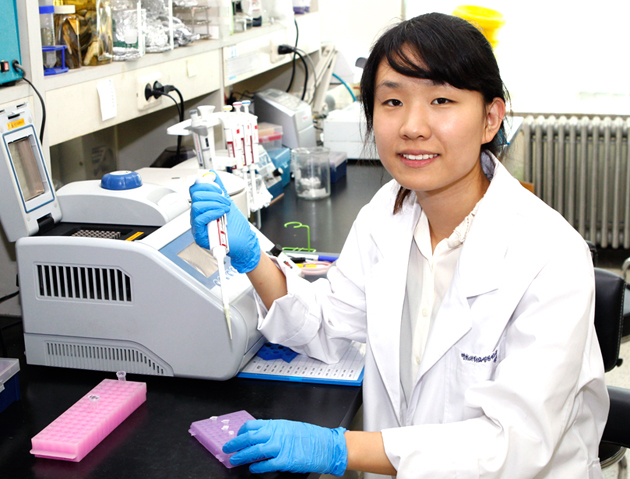Senior in Department of Life Sciences Won, Ha Ri Wins 'Best Thesis Award' from the Korean Association of Biological Sciences
First time for an undergraduate to win the award from the top academic society in the life sciences sector
[August 26, 2013]
 Won, Ha Ri wins best thesis award for the first time in the history of the Korean Association of Biological Sciences as an undergraduate
Won, Ha Ri wins best thesis award for the first time in the history of the Korean Association of Biological Sciences as an undergraduate "A typical reaction to claims for preserving endangered species is that there just a luxury for investments in this. However, I believe for the overall balance of the eco-system, it is very necessary."
Won, Ha Ri (22), a senior at the YU Department of Life Sciences that suggested a new method for preserving genetic resources that are now disappearing, won the 'best thesis award' at the annual academic conference of the Korean Association of Biological Sciences (KAOBS), which is the top academic society in the life sciences sector. This is the first time for an undergraduate to win the award.
The Korean Association of Biological Sciences is a large academic society that combined 9 societies in the bio science fields such as the Ecological Society of Korea, Korean Society of Systematic Zoology, Korean Society of Biology Education, Genetics Society of Korea, and the Korean Society for Integrative Biology. It hosts an annual academic conference since its organization in 1957. Usually, professors, PhD researchers, and graduate school students participated to contribute to the development of life sciences in Korea. A total of about 300 theses were submitted in the 5 sectors of ecology, integrative biology, systematic zoology, biology education, and genetics in this year's academic conference held at Seogang University on the 12th and 13th. The top thesis in each sector is given the 'best thesis award'.
The only undergraduate student among the 5 winners, Won, was chosen as the best paper in the systematic zoology sector with her thesis titled 'Complementary consideration of genetic uniqueness and variation in conservation strategy : a case study of Rhodeus notatus'. It criticized the existing genetic resource preservation method that emphasized only uniqueness, while suggesting a progressive preservation strategy.
The object of the experiment was the Rhodeus notatus (Acheilognathinae species of the Cypriniformes family), which is a freshwater fish that is on a rapid decline in numbers. Won carried out genetic studies on 104 Rhodeus notatus collected in rivers around the nation such Hangang, Geumgang, Yeongsangang, Tamjingang and Geumhogang. The result showed that even though they had the same genes of the species, there were various transformations depending on the region, and also found that this was the result of reflecting the ecological characteristics of the region in which they lived. This result means that the regional and ecological diversity must be taken into consideration for the preservation of species.
Professor Suk, Ho Young (44) of the YU Department of Life Sciences, who was the advisor to Won, Ha Ri, said, "This shows that it is very important to identify not only the genetic features, but also its environmental features to properly preserve biological resources." He added, "Through the UN Convention on Biological Diversity (UNCBD), the world is in a 'war of species'. There is a need for more research and efforts to not only preserve species in Korea, but also to prove that the original source of species overseas is Korea."
Won, who is planning to enroll in a combined integrated master's-doctoral program after completing her undergraduate program, said, "I accept this award as an encouragement and I hope to become a scientist who shows the general public how important it is to preserve species by working harder in my research."










